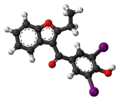Benziodarone
Benziodarone is a diuretic medication that was used in the treatment of edema associated with congestive heart failure, cirrhosis, and other conditions that cause fluid retention. It belongs to a class of drugs known as benzofuran derivatives, which work by increasing the excretion of water and sodium from the body. Despite its effectiveness, the use of benziodarone has been limited due to concerns over side effects and its availability has been restricted in many countries.
Mechanism of Action[edit]
Benziodarone acts primarily by inhibiting the reabsorption of sodium and chloride ions in the kidneys, leading to an increase in the volume of urine produced (diuresis). This mechanism is similar to that of other diuretics, which helps to reduce fluid accumulation in the body's tissues. Additionally, benziodarone has been reported to have a mild vasodilator effect, which can contribute to its therapeutic effects in congestive heart failure by reducing the workload on the heart.
Indications[edit]
Benziodarone was indicated for the treatment of edema associated with:
- Congestive heart failure
- Cirrhosis of the liver
- Other conditions characterized by excess fluid retention
Side Effects[edit]
The use of benziodarone can be associated with several side effects, including:
- Electrolyte imbalance, particularly hypokalemia (low potassium levels)
- Gastrointestinal disturbances, such as nausea and vomiting
- Skin rash or other allergic reactions
- Potential for liver toxicity, which has been a significant concern with its use
Due to these side effects, particularly the risk of liver toxicity, the use of benziodarone has been limited and it is not widely available.
Pharmacokinetics[edit]
Benziodarone is absorbed from the gastrointestinal tract after oral administration. Its metabolism occurs in the liver, and it is excreted primarily in the urine. The pharmacokinetic profile of benziodarone can be affected by liver function, and caution is advised in patients with impaired liver function.
Contraindications[edit]
Benziodarone is contraindicated in patients with:
- Known hypersensitivity to benziodarone or any of its components
- Severe liver impairment or active liver disease
- Severe renal impairment
Drug Interactions[edit]
Benziodarone may interact with other medications, including other diuretics, leading to an increased risk of electrolyte imbalance. It is important for patients to inform their healthcare provider of all medications they are taking to avoid potential drug interactions.
Conclusion[edit]
While benziodarone has been effective in the treatment of edema associated with various conditions, its use has been overshadowed by concerns regarding its safety profile, particularly the risk of liver toxicity. Healthcare providers must weigh the benefits and risks of benziodarone therapy on an individual basis and consider alternative treatments when appropriate.
Benziodarone[edit]
-
Benziodarone
-
Benziodarone
Ad. Transform your life with W8MD's Budget GLP-1 injections from $75


W8MD offers a medical weight loss program to lose weight in Philadelphia. Our physician-supervised medical weight loss provides:
- Weight loss injections in NYC (generic and brand names):
- Zepbound / Mounjaro, Wegovy / Ozempic, Saxenda
- Most insurances accepted or discounted self-pay rates. We will obtain insurance prior authorizations if needed.
- Generic GLP1 weight loss injections from $75 for the starting dose.
- Also offer prescription weight loss medications including Phentermine, Qsymia, Diethylpropion, Contrave etc.
NYC weight loss doctor appointmentsNYC weight loss doctor appointments
Start your NYC weight loss journey today at our NYC medical weight loss and Philadelphia medical weight loss clinics.
- Call 718-946-5500 to lose weight in NYC or for medical weight loss in Philadelphia 215-676-2334.
- Tags:NYC medical weight loss, Philadelphia lose weight Zepbound NYC, Budget GLP1 weight loss injections, Wegovy Philadelphia, Wegovy NYC, Philadelphia medical weight loss, Brookly weight loss and Wegovy NYC
|
WikiMD's Wellness Encyclopedia |
| Let Food Be Thy Medicine Medicine Thy Food - Hippocrates |
Medical Disclaimer: WikiMD is not a substitute for professional medical advice. The information on WikiMD is provided as an information resource only, may be incorrect, outdated or misleading, and is not to be used or relied on for any diagnostic or treatment purposes. Please consult your health care provider before making any healthcare decisions or for guidance about a specific medical condition. WikiMD expressly disclaims responsibility, and shall have no liability, for any damages, loss, injury, or liability whatsoever suffered as a result of your reliance on the information contained in this site. By visiting this site you agree to the foregoing terms and conditions, which may from time to time be changed or supplemented by WikiMD. If you do not agree to the foregoing terms and conditions, you should not enter or use this site. See full disclaimer.
Credits:Most images are courtesy of Wikimedia commons, and templates, categories Wikipedia, licensed under CC BY SA or similar.
Translate this page: - East Asian
中文,
日本,
한국어,
South Asian
हिन्दी,
தமிழ்,
తెలుగు,
Urdu,
ಕನ್ನಡ,
Southeast Asian
Indonesian,
Vietnamese,
Thai,
မြန်မာဘာသာ,
বাংলা
European
español,
Deutsch,
français,
Greek,
português do Brasil,
polski,
română,
русский,
Nederlands,
norsk,
svenska,
suomi,
Italian
Middle Eastern & African
عربى,
Turkish,
Persian,
Hebrew,
Afrikaans,
isiZulu,
Kiswahili,
Other
Bulgarian,
Hungarian,
Czech,
Swedish,
മലയാളം,
मराठी,
ਪੰਜਾਬੀ,
ગુજરાતી,
Portuguese,
Ukrainian


